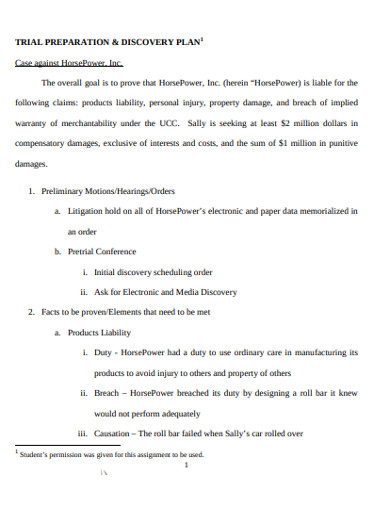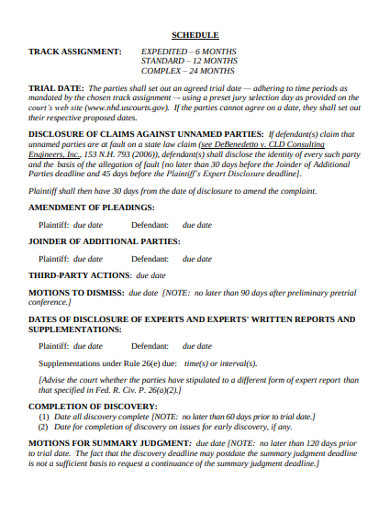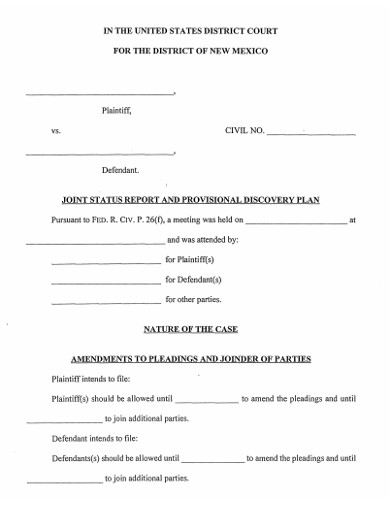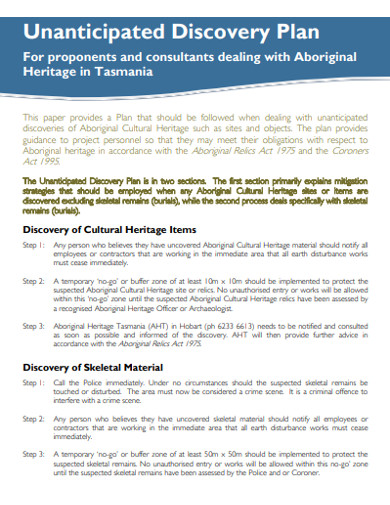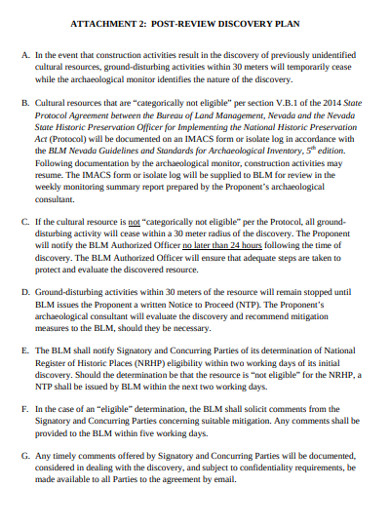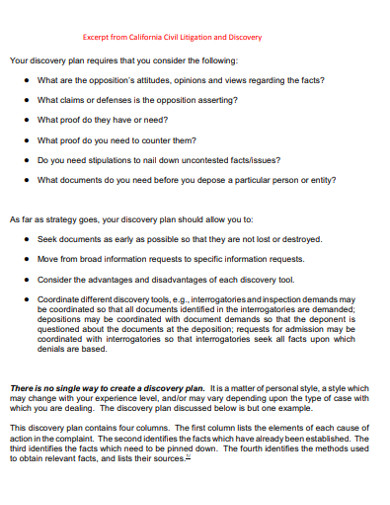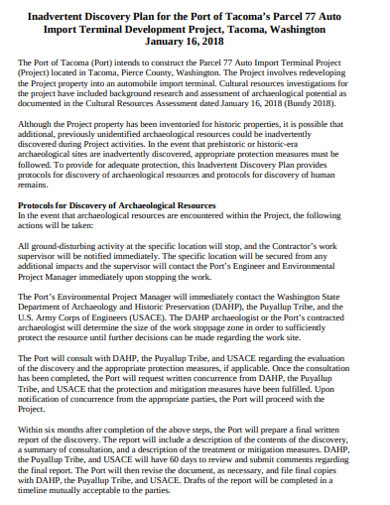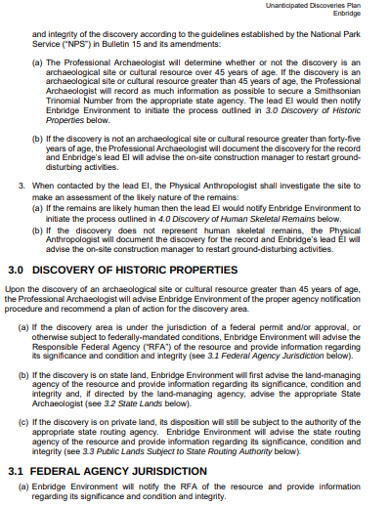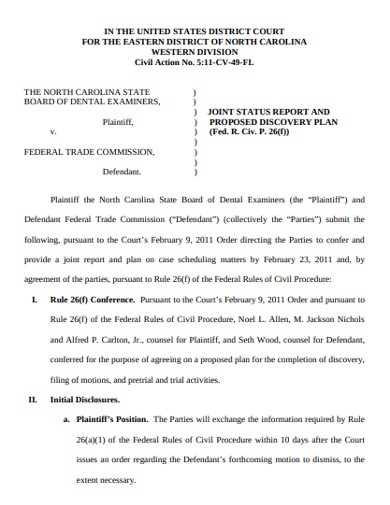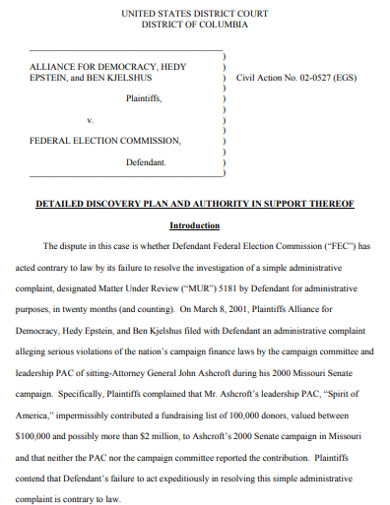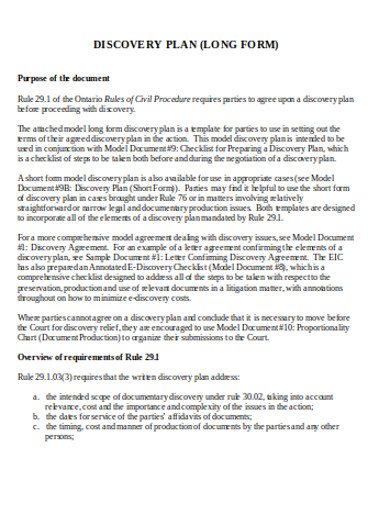10+ Discovery Plan Examples to Download
In law, the court may provide a subpoena to the affecting individuals or organizations as part of the trial procedure. This legal instrument can force the said individuals to testify and provide relevant information that will help progress or solve a legal case. The court may issue this type of document as part of a discovery plan. Aside from the law, you can also use discovery in other fields such as marketing strategy, psychology test, preschool, and clinical trials.
What is Discovery Plan?
Simply put, you can use a discovery plan to uncover evidence and facts that will prove the existence of a particular phenomenon. This method can also help you determine the real problem or issue of an organization, making it a vital instrument in various fields of research, such as market research.
Guided Discovery in Health and Clinical Purposes
As we have mentioned earlier, you can apply discovery in various fields. For example, experts use guided discovery as part of Cognitive Behaviour Therapy(CBT). It allows psychologists to know how a patient processes information. Through this process, the analysts will be able to gauge the thinking capabilities of the subjects, which is a crucial step in changing the perceptions and behaviors of a person.
Another example of a guided discovery is the procedures that optometrists follow when determining the right lenses for their patients. Through trial and error, the opticians will identify the accurate eye prescription for their patients.
Advancement in Discovery
Modern problems require modern solutions! As technology advances, people gradually stop using the old ways of doing things. Sending monthly utility bills through emails is one of the changes that are happening progressively. People are starting to produce and relay certain documents electronically. Legal proceedings are not an exemption of this change. We call this transaction as Electronic Discovery. This activity may include litigations, government investigations, and other methods of gathering information in an electronic format.
10+ Discovery Plan Examples
To know how a discovery plan should look like in the real world, go over the downloadable documents that we listed below.
1. Trail Preparation and Discovery Plan Example
2. Sample Discovery Plan Example
3. Discovery Plan Form Example
4. Unanticipated Discovery Plan Example
5. Sample Post Discovery Plan Example
6. Civil Litigation and Discovery Plan Example
7. Inadvertent Discovery Plan Example
8. Formal Discovery Plan Example
9. Discovery Report Plan Example
10. Discovery Plan and Authority Example
11. Discovery Plan in DOC
How to Make a Smart Discovery Plan?
To come up with a creative curriculum for your pre k or toddler students, you may need to create a smart discovery plan. Read the following guidelines to develop an exceptional discovery plan.
1. Determine The Purpose of Your Plan
The first thing that you should do to come up with a smart discovery plan is defining the purpose of your project. Start by identifying the target audience. Are they your customers or potential buyers, staff members, or the citizens affected by the operation of your business production. Understand what these people actually want to happen. Know the existing information about the problem and the need for your expertise to come into the equation. Is there a benchmark that will help you determine your success?
2. Investigate the Problem
Now that you have understood the needs of the target audience, look at the problem from different angles. This step will allow you to determine the real problem of the stakeholders. There are chances that from the initial issues and needs that you have identified in the previous step, the investigation will direct you to a different problem, which you didn’t see earlier. To proceed with this step, you can do brainstorming with your team.
3. Discover the Appropriate Solution and its Requirements
After the problem investigation, you will be able to determine the proper solution to the said problem. In this step, list down all the items that you and other affecting factors need to have and the actions that you need to do to apply the solution.
4. Consider using Innovative Solutions
A particular discovery can connect to other types of development to materialize its goal. In determining the requirements of the resolution of your problem, you may need to use innovative solutions. To effectively do it, you may use another type of discovery, which is the lean discovery.
As a problem approaches, you can either fix it or run away from it. The latter can be a terrible way of dealing with such things. However, fixing the problem based on its most visible side may not be a practical way to face the challenge. Create a discovery plan to get a better understanding of the said problem. This tool can help you come up with the real problem and its right solution.



